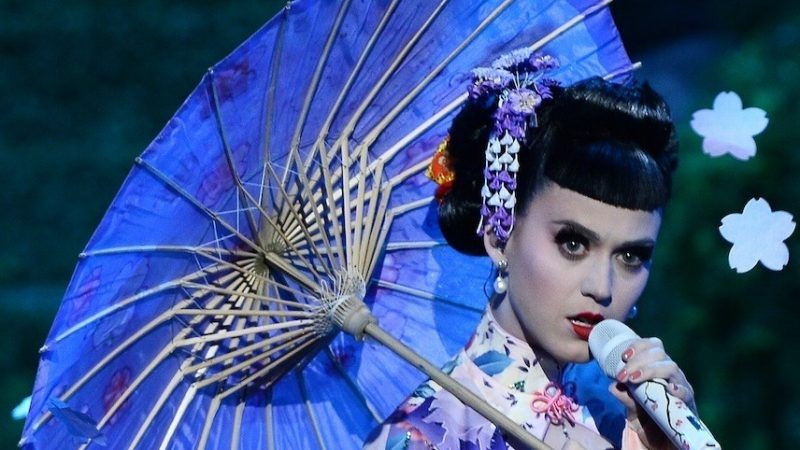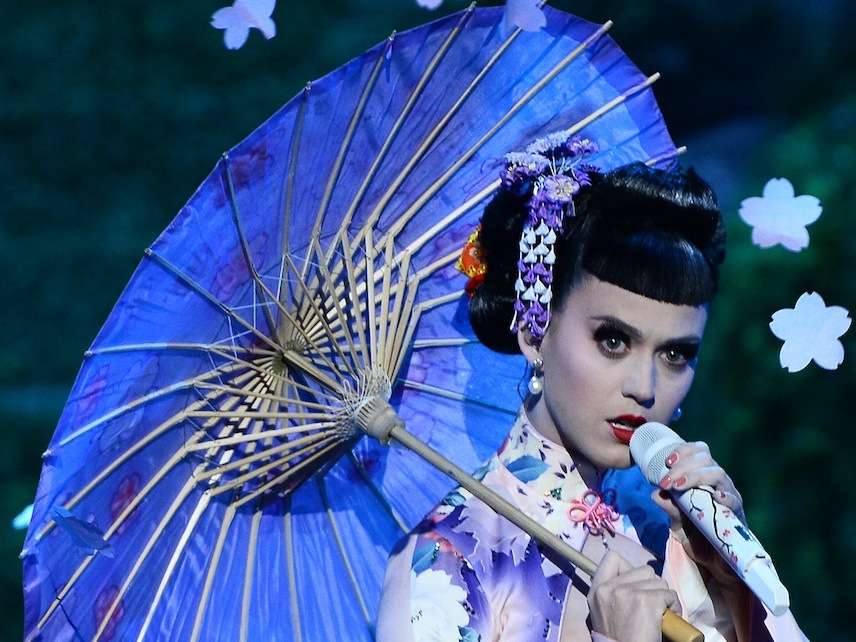Katy Perry Is Very Sorry She Once Wore Her Hair in Cornrows
The cultural appropriation hysteria reaches a fever pitch.


Katy Perry has made a public apology. She's been filmed making a mea culpa. She has confessed to having made "several mistakes" in recent years. So what exactly were her moral crimes? Did she get embroiled in a drug scandal? Is she a tax-dodging queen? Did her spat with Taylor Swift cross the line from tweets to violence?
Nope. She once wore her hair in cornrows.
The cultural appropriation hysteria has reached such a fever pitch that celebs are now apologizing for hairstyles. In an interview with DeRay McKesson, Black Lives Matter activist and host of the podcast Pod Save The People, Perry fessed up to her many "mistakes," including sporting cornrows in the video for "This Is How We Do" and rocking the geisha look at the 2013 American Music Awards. In the world of the cultural-appropriation fanatic, who frowns viciously upon any borrowing from a culture other than one's own, such behavior is tantamount to blacking-up and singing "Mammy."
Perry has now learnt the lesson of her crazy foray into cultural imperialism and arrogant white-lady hairstyle theft. "Why can't I wear my hair that way?," she asked herself when "This Is How We Do" caused a Twitter-stink. Luckily for her, "empowered angels"—B.S. spiritual talk for politically correct people—were on hand to give her an answer. It's because there is "power in black women's hair" and white women can't just steal that.
Acknowledging that her whiteness means she will never fully grasp this mystery of black women's hair-related power, Perry says she's nonetheless trying to redeem herself for her crimes against cultural purity. "I will never understand, but I can educate myself, and that's what I'm trying to do," she told McKesson.
This act of moral self-flagellation, this very public confession of wickedness, confirms how widespread the cultural-appropriation panic has become. When even someone as pop as Perry, who has more Twitter followers than most countries have citizens, is playing the awful game of bowing and scraping before cultural dividing lines, you know the P.C. madness has gone mainstream.
Will other celebrities follow suit? Will Beyonce finally apologize for that time she wore a sari, which Teen Vogue, fashion mag turned mouthpiece of P.C. silliness, held up as proof that India is treated as "a shallow vessel that exists for Westerners to find themselves"? Will Zoe Saldana beg forgiveness for using darkening make-up to play Nina Simone, which one mag branded an act of black appropriation whose "degree of wackness… can't be overstated"? And how about Ke$ha, who in the video for "Crazy Kids" wears not only cornrows but also a grill and enough bling to make Mr. T balk?
The clampdown on cultural appropriation has gone crazy. Campuses forbid the wearing of sombreros lest Mexicans feel culturally violated. Britain's Glastonbury music festival has banned the sale of Native American headdress. Authors are warned against writing characters of a different race or culture to them, which I'm pretty sure would make the entire enterprise of literature impossible, or at least pointless.
Anthony Horowitz, British author of the wildly popular Alex Rider teen novels, was advised not to include a black character in his latest story because that is "not [your] experience." Imagine if all authors wrote only from personal experience. All of Shakespeare's plays would be about people who grew up the sons of glove-makers in sleepy Stratford. More importantly, the very humanity of literature, its capacity for finding the universal in the particular, for uncovering some of the truth of human life across the racial, gender, and sexual board, would be destroyed.
The aim of the sanction against cultural appropriation is actually pretty sinister. It is to keep us in our cultural lanes. It is to lock us into our racial boxes. It's a plea for cultural purity, a rehashing in P.C. lingo of that dark, old 20th-century idea that biology or heritage should count for more than our shared humanity, and that blacks and whites will never really understand each other. Don't mix, it says. It rehabilitates segregation, or at least the segregationist imagination. "I will never understand," as Perry said. That is, she'll never understand black people. How depressing is it that this has become an acceptable and even media-praised thing to say in 2017?
"I will never understand" is the cry of the right-on in the 21st century, and it runs directly counter to every properly liberal, enlightened movement of the past hundred years, which encouraged understanding, solidarity in fact, across the racial divide.
This new celebration of cultural purity deadens culture. It drains pop culture in particular of the thing that keeps it alive and urgent and sometimes brilliant: its fusions and rip-offs and derivations. Pretty much every form of popular entertainment we enjoy is a product of cultural mixing, whether it's rock, springing from the interactions of blacks and whites in the South, or hip-hop, which in the early days nodded to 1970s European electro music, or Western blockbuster movies, which have borrowed from the style and feel of East Asian cinema. All culture is "cultural appropriation." Cultural appropriation isn't some terrible evil—it's the stuff of life itself.
How awful that Perry is communicating to her young fan base the idea that it's bad to borrow from other cultures. Why is she doing this? Well, there's the rub. It's because while white self-flagellation might look like self-hatred, it is in fact, darkly ironically, a new shortcut to the moral high ground. It's how you show you're "woke." It's how you prove you're a Good White Person in contrast with white trash who wear chunky jewelry and speak in black twangs or college students who think it's okay to don a sombrero.
Whether it's Perry apologizing for her cultural crimes, Macklemore rapping about his white privilege, or Lena Dunham bemoaning "privileged white womanhood," modern culture is stuffed with white folks beating themselves up. But their self-ridicule is really an advert of their white wokeness. So not only does the cultural-appropriation hysteria racially compartmentalize humanity, it also creates the space for a new, weird, destructive form of political correctness. Everything about it is terrible.


Show Comments (123)